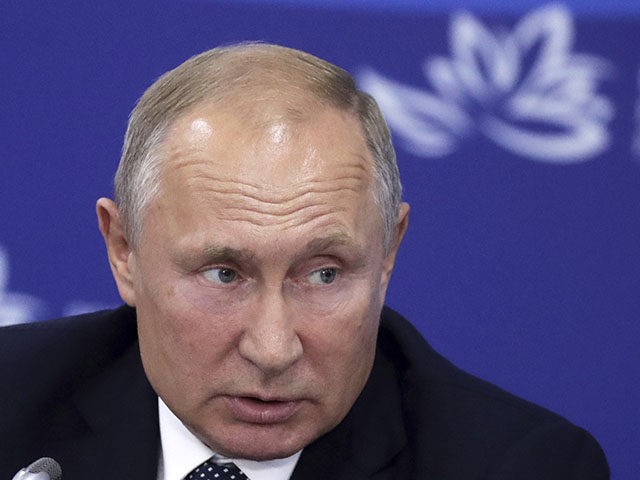The rumblings of a political earthquake have been heard in Moscow, where longtime members of President Vladimir Putin’s scandal-tainted United Russia party are bailing out and running as independents in Sunday’s city elections, even as actual independent candidates are forced off the ballot with administrative tricks.
The Washington Post on Thursday noted the remarkable detail that no one from the ruling party is openly running for a seat in Moscow. The United Russia candidates have all registered as “independents” to overcome the deep unpopularity of Putin’s party, while the election has been rigged to keep genuine opposition candidates from running at all — a situation that produced angry demonstrations over the summer that have been compared to the Hong Kong protest movement.
As the Washington Post explained, United Russia’s camouflage act extends far beyond Moscow:
The party’s support has eroded faster than Putin’s, but his has been declining as well. Analysts chalk that up to a struggling economy, a weariness over corruption and what seems to many Russians as political stagnation — including a decay of patriotic feeling following the spike of enthusiasm after Russia’s seizure of Crimea from Ukraine in 2014.
And that’s not just in Moscow. Elections are being held 18 regions and 26 cities , and United Russia’s participation can be hard to find.
In Khabarovsk, on the Pacific coast, candidates from the ruling party are running on the Time For Change ballot line. (Critics point out that name doesn’t capture the spirit of the party’s actual approach to politics.) In Irkutsk, by the shores of Lake Baikal, the pro-Putin faction is called Our Irkutsk.
The governor of St. Petersburg, Alexander Beglov, who has worked in city government since Putin was there, in the 1990s, is also running as an independent. He took office last year, when his predecessor left for another post, and was widely mocked after a big snowfall last winter for having himself televised while handing out shovels to United Russia officials. Critics suggested it would be better for the city to invest in more mechanized snow removal equipment.
The Post observed United Russia rigging the election with tactics such as waves of phony candidates flooding into registration offices to prevent them from registering real opposition candidates, proxy parties that only pretend to oppose Putin running in districts where United Russia is embarrassed to compete, and demonizing the protest movement in much the same way the Chinese Communist Party is trying to whip up nationalist sentiment against the protest movement in Hong Kong.
The Times of London saw longtime United Russia loyalists “abandoning the party in droves” in a desperate bid to escape “the whiff of disengagement and corruption which increasingly follows the party.”
In theory, these tactics should be futile because Russian voters can easily do research online to discover which candidates are really United Russia members in disguise. The Post and Times explained that Russian politics have become so confusing that many voters will skip the whole circus in disgust, while others will be reluctant to vote for “anybody except the United Russia candidate” because many of the others who managed to get on the ballot are communists.
Opposition leader and indefatigable Putin gadfly Alexei Navalny has nevertheless launched an organized “smart voting” effort that will automatically provide interested voters with the names of candidates they can vote for instead of the disguised United Russia candidate in their districts.
Foreign Policy on Tuesday gave Putin a terminal political diagnosis, arguing the rambunctious Moscow city elections are a harbinger of doom for United Russia and massive political realignment across Russia.
The surprisingly large and resilient summer protest movement could be taken as a sign that Putin’s tactics for controlling the Russian electorate are beginning to fail. The prospects of Putin retaining enough legislative muscle to change the constitution so he can remain in office after 2024 are growing dim.
“More and more people are growing discontent, and what is most important for me is that people are losing fear. For many years people wouldn’t be protesting or they would be afraid of participating in unsanctioned rallies,” noted Natalia Arno of the U.S.-based Free Russia Foundation.
Foreign Policy suggested United Russia’s corruption problem, combined with crashing oil prices, economic stagnation, domestic policy failures, and infighting between elite factions have fatally undermined “Putin’s social contract of authoritarian rule in exchange for stability and prosperity.”
There is a growing sense that restless Russians are practically daring Putin to attempt violent repression. Thousands of people flagrantly defied a ban on street protests last weekend, ignoring threats of arrest and laughing off a police effort to undercount their numbers by 90 percent. Many said they had never considered attending a protest rally before.
The protesters demanded freedom for imprisoned activists, resignations from government officials allied with Putin, and freedom for Russia. “Russia without Putin!” is among the most popular chants at these demonstrations.

COMMENTS
Please let us know if you're having issues with commenting.